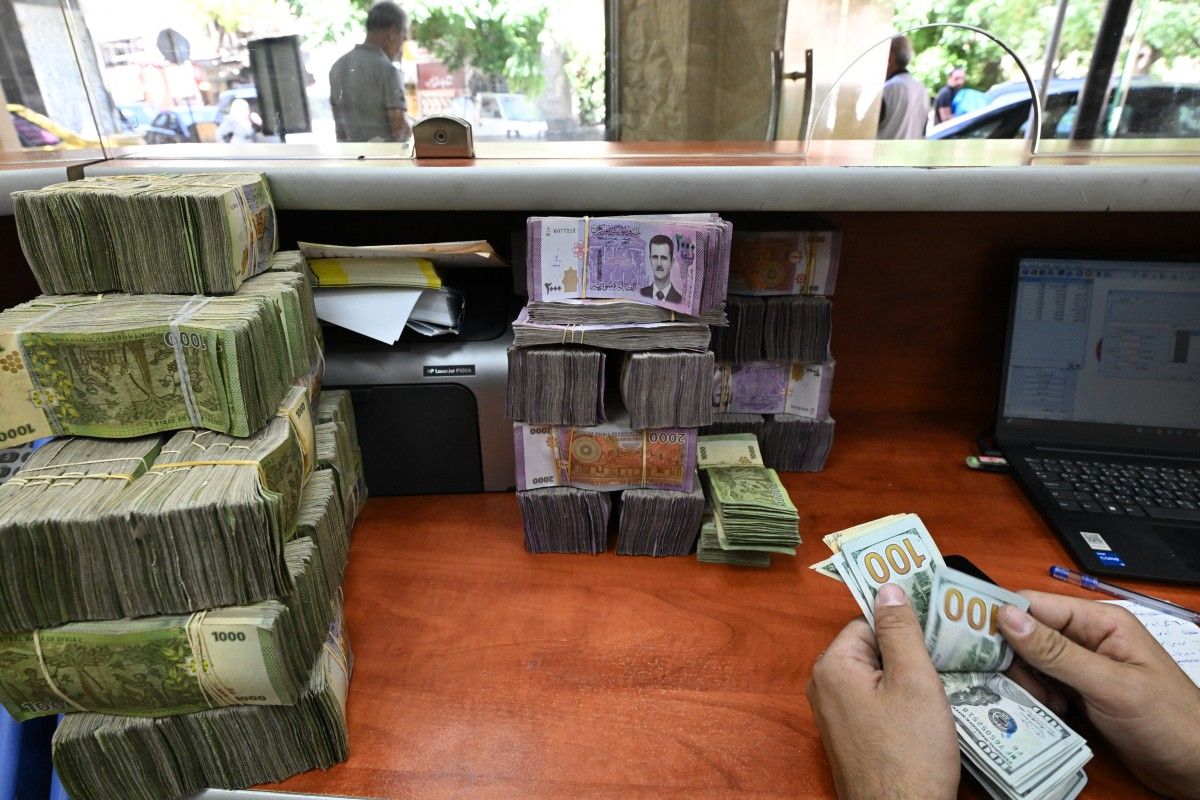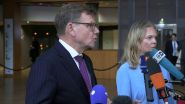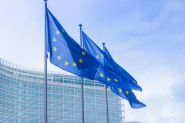- Home
- Middle East
- Syrians Hope for Economic Recovery After West Lifts Sanctions

An employee sits in front of stacks of Syrian pounds as he counts US dollars at an exchange counter in Damascus on May 21, 2025. EU countries agreed on May 20 to lift all their remaining economic sanctions on Syria in a bid to help the war-torn country recover after the ouster of Bashar al-Assad. ©LOUAI BESHARA / AFP
At a currency exchange in Damascus, Anas al-Shammaa is one of many Syrians hopeful that promised relief from Western sanctions will help revive their country's economy after years of war and isolation.
"We were totally cut off from the world," said Shammaa, 45, who has been running the exchange shop since 2008.
With the lifting of sanctions, "we hope that the Syrian economy will start to recover both gradually and quickly", he told AFP.
Syria's economy plunged into crisis during the years of civil war, which erupted in 2011 with former ruler Bashar al-Assad's brutal repression of anti-government protests.
Western countries imposed crippling sanctions on Syria, including on dealing with financial institutions linked to Assad's government, and froze the central bank's assets.
Last week, more than five months after Assad's ouster, Washington announced it would lift sanctions on Syria, and on Tuesday the European Union said it would also remove economic restrictions, sparking hope among Syrians of an economic reboot.
But experts have warned it will take time to see real relief, with the new authorities also needing to take steps to attract investment.
Shammaa expressed hope that "the central bank will be reconnected with international banks and that commercial activity will become easier"—and" that Syrians abroad will be able to more easily send money home to their families.
After the US announcement, the Syrian pound surged to 8,500 against the dollar on the black market, from 13,000 a day earlier, though experts said it was a temporary jump.
'Historic Step'
Economics graduate Mohammed al-Halabi, 25, expressed hope that Syrians could soon abandon the black market for money transfers, where almost a third of their value can be lost in fees and other costs.
Transfers could become as simple as "clicking a button", like in other countries, he said hopefully.
Throughout the civil war, Syrians abroad struggled to find ways around the restrictions to send money to loved ones back home, a vast number of whom depended on foreign remittances due to the collapse of the economy.
Removing sanctions is also a key step towards rebuilding the war-torn country, as the measures punished anyone involved in reconstruction while Assad remained in power.
Syria's new authorities are now counting on international support including from the European Union to launch reconstruction, which the United Nations has estimated could cost more than $400 billion.
Syrian interim President Ahmed al-Sharaa said Wednesday that the removal of EU sanctions was a "historic step" and welcomed "European companies wanting to invest in Syria".
Syrian central bank governor Abdul Qadir al-Hasriya said on Facebook that the lifting of sanctions "is an important step on the path of restoring normal economic and financial relations with the international community".
But analysts have cautioned that the immediate impact is likely to be limited, with the new authorities also needing to take steps such as ensuring transparency in order to encourage investment.
'Way Behind'
Benjamin Feve, senior research analyst at Karam Shaar Advisory, a consultancy focused on Syria's political economy, said that "with sanctions lifted on Syria in general, we expect increased activity in rebuilding the infrastructure, such as roads, hospitals, schools".
"Countries like Saudi Arabia, Qatar, Turkey, which have ties with the new government, are likely to accelerate trade and investment, especially in reconstruction," he told AFP.
But other sectors such as energy and banking "require significant investment and much more time... to actually materialise. So that would probably take a few more months", he said.
Feve added that foreign lenders will have to assess Syrian banking compliance standards, which "will take some time", with Syria "way behind in terms of anti-money laundering compliance and counter-financing of terrorism compliance".
After decades of institutional corruption under Assad family rule, the new authorities have yet to announce economic reforms or laws governing foreign investment.
One Syrian businessman who works between Damascus and Dubai said that since Assad's ouster, he had hoped to broaden his investments in his native country.
But legislative and procedural opacity had stopped him from doing so, he told AFP, requesting anonymity to discuss his business decisions.
Zohair Fawwal, 36, who sells electronic equipment in Damascus, said he didn't expect to see an immediate impact of the lifting of sanctions.
He said the most he could hope for right now was access to "applications like Netflix and TikTok", which are currently banned in Syria.
By Maher al-Mounes / AFP
Read more



Comments